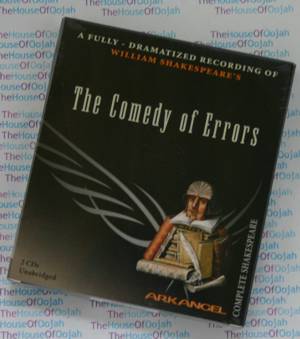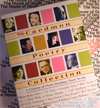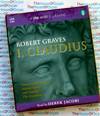The Comedy of Errors by William Shakespeare - Unabridged Play on Audio CD
Brand New : Unabridged 2 Audio CDs 88 minutes
Egeon faces execution, unless he can pay a fine of a thousand marks. He tells his sad story. In his youth, he married and had twin sons. On the same day, a poor woman also gave birth to twin boys, and he purchased these as slaves to his sons. Soon afterwards, the family made a sea voyage, and was hit by a tempest. Egeon lashed himself to the main-mast with one son and one slave, while his wife was rescued by one boat, Egeon by another. Egeon never again saw his wife, or the children with her. Recently, his son Antipholus of Syracuse, now grown, and his son’s slave Dromio of Syracuse, left Syracuse on a quest to find their brothers. When Antipholus of Syracuse did not return, Egeon set out in search of him. Solinus, Duke of Ephesus, is moved by this story, and grants Egeon one day to pay his fine. That same day, Antipholus of Syracuse arrives in Ephesus, searching for his brother. He sends Dromio of Syracuse to deposit some money at The Centaur (an inn). He is confounded when the identical Dromio of Ephesus appears almost immediately, denying any knowledge of the money and asking him home to dinner, where his wife is waiting. Antipholus, thinking his servant is making insubordinate jokes, beats Dromio.
Dromio of Ephesus returns to his mistress, Adriana, saying that her "husband" refused to come home, and even pretended not to know her. Adriana, concerned that her husband's eye is straying, takes this news as confirmation of her suspicions. Antipholus of Syracuse, who complains "I could not speak with Dromio since at first I sent him from the mart," meets up with Dromio who now denies making a "joke" about Antipholus having a wife. Antipholus begins beating him again. Suddenly, Adriana rushes up to Antipholus and begs him not to leave her. The Syracusans cannot but attribute these strange events to witchcraft, remarking that Ephesus is known as a warren for witches. Antipholus and Dromio go off with this strange woman, to eat dinner and keep the gate, respectively. Antipholus of Ephesus returns home for dinner and is enraged to find that he is rudely refused entry to his own house by Dromio of Syracuse, who is keeping the gate. He is ready to break down the door, but his friends persuade him not to make a scene. He decides, instead, to dine with a Courtesan. Inside the house, Antipholus of Syracuse discovers that he is very attracted to his wife's sister, Luciana, telling her "train me not, sweet mermaid, with thy note / To drown me in thy sister's flood of tears." She is flattered by his attentions, but worried about their moral implications. After she exits, Dromio of Syracuse announces that he has discovered that he has a wife: Nell, a hideous kitchen-maid. He describes her as "spherical, like a globe; I could find out countries in her...buttocks: I found it out by the bogs." He claims he has discovered America and the Indies "upon her nose all o'er embellished with rubies, carbuncles, sapphires, declining their rich aspect to the hot breath of Spain; who sent whole armadoes of caracks to be ballast at her nose." This is one of Shakespeare's few references to America. The Syracusans decide to leave as soon as possible, and Dromio runs off to make travel plans. Antipholus is apprehended by Angelo, a goldsmith, who claims that he ordered a chain from him. Antipholus is forced to accept the chain, and Angelo says that he will return for payment.
Antipholus of Ephesus dispatches Dromio to purchase a rope so that he can beat his wife Adriana for locking him out, then is accosted by Angelo, who tells him "I thought to have ta'en you at the Porpentine" and asks to be reimbursed for the chain. He denies ever seeing it, and is promptly arrested. Antipholus dispatches Dromio back to Adriana's house to get money for his bail. After completing this errand, Dromio of Syracuse mistakenly delivers the money to Antipholus of Syracuse. The Courtesan spies Antipholus wearing the gold chain, and says he promised it to her. The Syracusans deny this, and flee. The Courtesan resolves to tell Adriana that her husband is insane. Dromio of Ephesus returns to the arrested Antipholus of Ephesus, with the rope. Antipholus is infuriated. Adriana, Luciana and the Courtesan enter with a conjurer named Pinch, who tries to exorcise the Ephesians, who are bound and taken to Adriana's house. The Syracusans enter, carrying swords, and everybody runs off for fear: believing that they are the Ephesians, out for vengeance after somehow escaping their bonds. Adriana reappears with henchmen, who attempt to bind the Syracusans. They take sanctuary in a nearby priory, where the Abbess resolutely protects them. The Duke and Egeon enter, on their way to Egeon's execution. Adriana begs the Duke to force the Abbess to release her husband. Then, a messenger from Adriana's house runs in and announces that the Ephesians have broken loose from their bonds and tortured Doctor Pinch. The Ephesians enter and ask the Duke for justice against Adriana. Egeon believes he has found his own son, Antipholus, who will be able to bail him, but both Ephesians deny having ever seen him before.
Suddenly, the Abbess enters with the Syracusan twins, and everyone begins to understand the confused events of the day. Not only are the two sets of twins reunited, but the Abbess reveals that she is Egeon's wife, Emilia. The Duke pardons Egeon. All exit into the abbey to celebrate the reunification of the family.
The Comedy of Errors is one of William Shakespeare's earliest plays, believed to have been written between 1592 and 1594. It is his shortest and one of his most farcical, with a major part of the humour coming from slapstick and mistaken identity, in addition to puns and wordplay. The Comedy of Errors (along with The Tempest) is one of only two of Shakespeare's plays to observe the classical unities. It has been adapted for opera, stage, screen and musical theatre.

About the Author William Shakespeare
(baptised April 26 1564 - died April 23 1616)
William Shakespeare (also spelled Shakspere, Shaksper, Shaxper, and Shake-speare, due to the fact that spelling in Elizabethan times was not fixed and absolute[8]) was born in Stratford-upon-Avon in April 1564, the son of John Shakespeare, a successful glover and alderman from Snitterfield, and of Mary Arden, a daughter of the gentry. His birth is assumed to have occurred at the family house on Henley Street. Shakespeare's christening record dates to April 26 of that year. Because christenings were performed within a few days of birth, tradition has settled on April 23 as his birthday. This date provides a convenient symmetry because Shakespeare died on the same day, April 23 (May 3 on the Gregorian calendar), in 1616.
Shakespeare probably attended King Edward VI Grammar School in central Stratford. While the quality of Elizabethan-era grammar schools was uneven, the school probably would have provided an intensive education in Latin grammar and literature. It is presumed that the young Shakespeare attended this school, since as the son of a prominent town official he was entitled to do so for free (although his attendance cannot be confirmed because the school's records have not survived). At the age of eighteen, he married Anne Hathaway, who was twenty-six, on November 28, 1582. One document identified her as being "of Temple Grafton," near Stratford, and the marriage may have taken place there. Two neighbours of Anne posted bond that there were no impediments to the marriage. There appears to have been some haste in arranging the ceremony, presumably because Anne was three months pregnant.
After his marriage, Shakespeare left few traces in the historical record until he appeared on the London theatrical scene. Indeed, the late 1580s are known as Shakespeare's "lost years" because no evidence has survived to show exactly where he was or why he left Stratford for London. On May 26, 1583, Shakespeare's first child, Susanna, was baptised at Stratford. Twin children, a son, Hamnet, and a daughter, Judith, were baptised on February 2, 1585. Hamnet died in 1596.
London and theatrical career
By 1592 Shakespeare was a playwright in London; he had enough of a reputation for Robert Greene to denounce him as "an upstart crow, beautified with our feathers, that with his Tygers hart wrapt in a Players hyde, supposes he is as well able to bombast out a blanke verse as the best of you: and being an absolute Johannes factotum, is in his owne conceit the onely Shake-scene in a countrey." (The italicised line parodies the phrase, "Oh, tiger's heart wrapped in a woman's hide" which Shakespeare wrote in Henry VI, part 3.)
By late 1594 Shakespeare was an actor, writer and part-owner of a playing company, known as the Lord Chamberlain's Men - the company took its name, like others of the period, from its aristocratic sponsor, in this case the Lord Chamberlain. The group became popular enough that after the death of Elizabeth I and the coronation of James I (1603), the new monarch adopted the company and it became known as the King's Men. Shakespeare's writing shows him to indeed be an actor, with many phrases, words, and references to acting, but there isn't an academic approach to the art of theatre that might be expected.
By 1596 Shakespeare had moved to the parish of St. Helen's, Bishopsgate, and by 1598 he appeared at the top of a list of actors in Every Man in His Humour written by Ben Jonson. Also by 1598 his name began to appear on the title pages of his plays, presumably as a selling point.
There is a tradition that Shakespeare, in addition to writing many of the plays his company enacted, and being concerned as part-owner of the company with business and financial details, continued to act in various parts such as the ghost of Hamlet's father, Adam in ""As You Like It"", and as the Chorus in ""Henry V"".
He appears to have moved across the Thames River to Southwark sometime around 1599. By 1604, he had moved again, north of the river, where he lodged just north of St Paul's Cathedral with a Huguenot family named Mountjoy. His residence there is worth noting because he helped arrange a marriage between the Mountjoys' daughter and their apprentice Stephen Bellott. Bellott later sued his father-in-law for defaulting on part of the promised dowry, and Shakespeare was called as a witness.
Various documents recording legal affairs and commercial transactions show that Shakespeare grew rich enough during his stay in London to buy a property in Blackfriars, London and own the second-largest house in Stratford, New Place.
Later years
Shakespeare's last two plays were written in 1613, after which he appears to have retired to Stratford. He died on April 23 1616, at the age of fifty-two, on the same date (though not same day for England was still functioning under the Julian calendar) as Spanish writer and poet Miguel de Cervantes. He also died on his birthday, if the speculation that he was born on April 23 is correct. He was married to Anne until his death and was survived by his two daughters, Susanna and Judith. Susanna married Dr John Hall, but there are no direct descendants of the poet and playwright alive today.
Shakespeare is buried in the chancel of Holy Trinity Church in Stratford-upon-Avon. He was granted the honour of burial in the chancel not on account of his fame as a playwright but for purchasing a share of the tithe of the church for £440 (a considerable sum of money at the time). A monument placed by his family on the wall nearest his grave features a bust of him posed in the act of writing. Each year on his claimed birthday, a new quill pen is placed in the writing hand of the bust.
He is believed to have written the epitaph on his tombstone:
Good friend, for Jesus' sake forbear,
To dig the dust enclosed here.
Blest be the man that spares these stones,
But cursed be he that moves my bones.
|



 0 Items (Empty)
0 Items (Empty)




